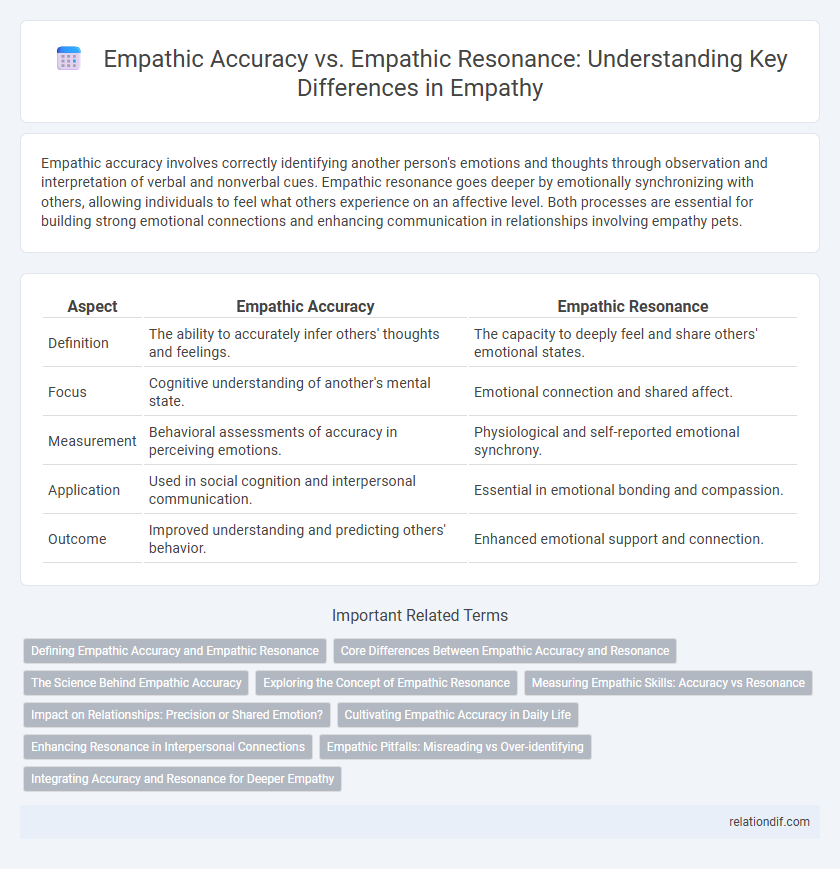Empathic accuracy involves correctly identifying another person's emotions and thoughts through observation and interpretation of verbal and nonverbal cues. Empathic resonance goes deeper by emotionally synchronizing with others, allowing individuals to feel what others experience on an affective level. Both processes are essential for building strong emotional connections and enhancing communication in relationships involving empathy pets.
Table of Comparison
| Aspect | Empathic Accuracy | Empathic Resonance |
|---|---|---|
| Definition | The ability to accurately infer others' thoughts and feelings. | The capacity to deeply feel and share others' emotional states. |
| Focus | Cognitive understanding of another's mental state. | Emotional connection and shared affect. |
| Measurement | Behavioral assessments of accuracy in perceiving emotions. | Physiological and self-reported emotional synchrony. |
| Application | Used in social cognition and interpersonal communication. | Essential in emotional bonding and compassion. |
| Outcome | Improved understanding and predicting others' behavior. | Enhanced emotional support and connection. |
Defining Empathic Accuracy and Empathic Resonance
Empathic accuracy refers to the ability to correctly infer another person's thoughts and feelings based on subtle cues and contextual information, emphasizing cognitive understanding. Empathic resonance involves a more affective process, where one emotionally mirrors or shares the feelings of another, highlighting emotional synchronization. Both constructs are essential in interpersonal communication, with empathic accuracy grounded in perception and interpretation, while empathic resonance is rooted in emotional connection.
Core Differences Between Empathic Accuracy and Resonance
Empathic accuracy involves correctly perceiving and understanding another person's thoughts and feelings, relying on cognitive processes to interpret emotional cues. Empathic resonance, on the other hand, refers to directly sharing or mirroring another's emotional experience through automatic, affective attunement. The core difference lies in accuracy's emphasis on objective understanding versus resonance's focus on emotional synchronization.
The Science Behind Empathic Accuracy
Empathic accuracy involves the precise ability to infer another person's thoughts and feelings through cognitive processes and nonverbal cues, supported by neural systems such as the medial prefrontal cortex and temporoparietal junction. Unlike empathic resonance, which emphasizes shared emotional experiences driven by mirror neuron activity, empathic accuracy relies on perspective-taking and theory of mind mechanisms to decode complex social signals. Research using functional magnetic resonance imaging (fMRI) highlights the brain's active role in evaluating contextual information to achieve accurate understanding of others' mental states.
Exploring the Concept of Empathic Resonance
Empathic resonance involves deeply tuning into another person's emotions, creating a shared emotional experience that fosters genuine connection. Unlike empathic accuracy, which centers on correctly identifying others' feelings, empathic resonance emphasizes the felt emotional synchrony that enhances interpersonal bonding and emotional understanding. This phenomenon plays a crucial role in psychotherapy, close relationships, and social cohesion by promoting intuitive emotional attunement and compassionate engagement.
Measuring Empathic Skills: Accuracy vs Resonance
Empathic accuracy refers to the ability to correctly identify others' emotions and thoughts, typically measured through objective assessments like the Empathic Accuracy Task. Empathic resonance, in contrast, emphasizes the emotional attunement and shared affective experience, often evaluated via physiological or subjective self-report measures. Measuring empathic skills involves combining both accuracy and resonance metrics to capture a comprehensive understanding of interpersonal empathy capabilities.
Impact on Relationships: Precision or Shared Emotion?
Empathic accuracy, defined as the ability to precisely understand another person's thoughts and feelings, enhances communication by reducing misunderstandings and fostering trust in relationships. Empathic resonance, the shared emotional experience, deepens emotional connection and validates partners' feelings, promoting intimacy and support. Balancing empathic accuracy with empathic resonance strengthens relationships by combining clear understanding with emotional bonding.
Cultivating Empathic Accuracy in Daily Life
Cultivating empathic accuracy involves actively observing verbal and nonverbal cues to accurately understand others' emotions and perspectives, fostering clearer interpersonal connections. Practicing mindfulness and reflective listening enhances one's ability to discern subtle emotional signals, leading to greater emotional insight and reduced misunderstandings. Daily interactions enriched by empathic accuracy promote trust and deepen relational bonds through precise emotional comprehension.
Enhancing Resonance in Interpersonal Connections
Empathic resonance involves deeply feeling and mirroring another person's emotions, creating a powerful emotional connection that enhances interpersonal trust and understanding. Unlike empathic accuracy, which focuses on correctly identifying others' feelings, resonance engages shared emotional experiences that strengthen relational bonds and foster genuine empathy. Techniques such as active listening and emotional attunement can significantly improve empathic resonance, promoting more meaningful and supportive interactions.
Empathic Pitfalls: Misreading vs Over-identifying
Empathic accuracy involves correctly interpreting another person's emotions without projecting personal feelings, while empathic resonance entails deeply sharing and mirroring those emotions. Misreading occurs when empathic accuracy fails, leading to misunderstandings of the other's emotional state, whereas over-identifying emerges from empathic resonance, causing blurred boundaries and loss of objectivity. Balancing empathic accuracy and resonance is crucial to avoiding these pitfalls and maintaining effective emotional connection.
Integrating Accuracy and Resonance for Deeper Empathy
Empathic accuracy involves precisely understanding another person's thoughts and feelings, while empathic resonance relates to sharing and mirroring those emotions internally. Integrating both accuracy and resonance enhances emotional connection, enabling deeper empathy that transcends surface-level understanding. This balanced approach fosters stronger interpersonal relationships by combining cognitive insight with authentic emotional engagement.
Empathic accuracy vs empathic resonance Infographic

 relationdif.com
relationdif.com